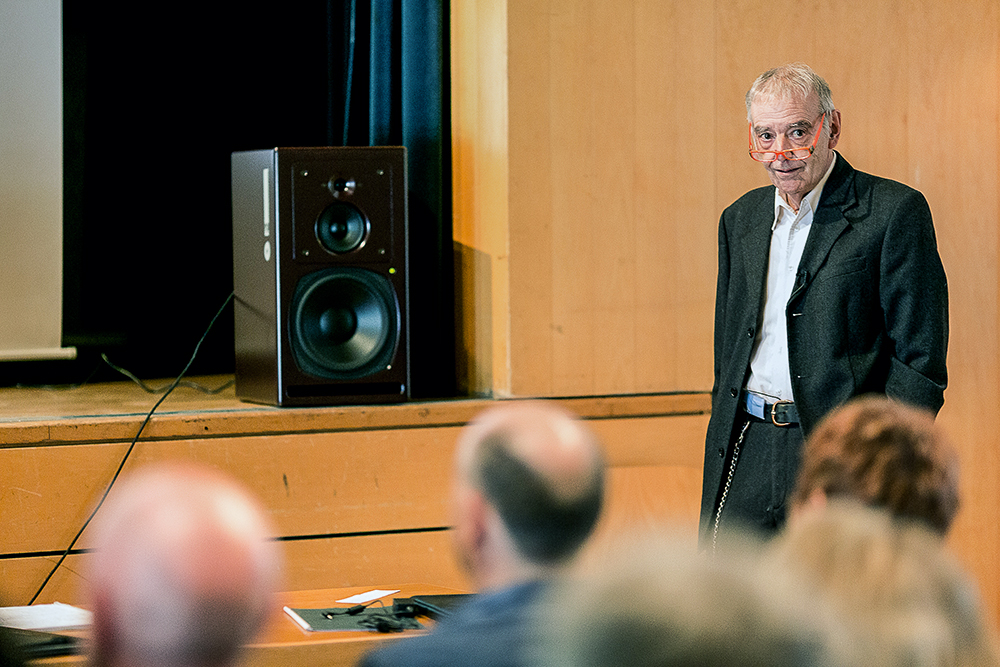Jürg Jecklin, born in Switzerland in 1938, worked in radio for 30 years as a recording engineer and producer before he joined the teaching staff at the mdw, where he then continued teaching all the way up to 2016—above all concerning loudspeaker systems and sound directing as well as recording analysis. He also made a central contribution to the development of the Tonmeister Education programme as such.

Switching from the radio business to a university was a big adjustment for Jecklin, who’s remained a very active person to this day. “I knew nothing about didactics or pedagogy”, he remembers. His brother, who was rector of a teachers’ college at the time, advised him not to simply contribute his many years of hands-on expertise; above all, his brother said, he should take his students seriously and be there for them. And that he did: his collection of notes on audio engineering is still in use today, and “Jecklin” is one of the most-searched-for terms on the university’s website—a fact that put quite a smile on the 79-year-old’s face when we told him.
“Most of all, of course, I wanted to give my students the knowledge and skills they needed to do the job. But another constant priority of mine was to support them in developing their personalities and their own individual styles.” He consistently urged his students to make recordings that they could truly call their own. And one of the most important things that he was able to pass on from his professional experience was how to deal with people in the right way: “In actual practice, one of the areas where audio engineers often fail is in dealing with musicians, who are particularly sensitive to how you interact with them. And I do think I managed to set an example here,” he states in his interview with mdw Magazine.
The great challenge inherent in interacting with all sorts of different people and artists, he says, was also one of the things that he enjoyed most about his profession: “In postproduction as it’s done today, the audio engineer sits alone in front of a screen with a keyboard and a mouse. But you still do have direct contact with the musicians, the music, and the sound as a result of the recording, as well as the musicians’ reaction to the recording.” It’s all this and much more that gives this type of work its general feel, its appeal to the senses—something that unfortunately, Jecklin hastens to add, doesn’t often play that great a role in the working world anymore.
The audio engineering profession has been transformed in recent years, and “conditions have gotten tougher. What you need most of all now is flexibility, plus openness to new things and the willingness to constantly expand your training— in other words, willingness to reorient yourself again and again,” Jecklin is convinced. Flexibility and inventiveness are two things that Jürg Jecklin has shown repeatedly over the years. It’s well known that necessity is the mother of invention, and it was thus that, back in the 1970s, Jecklin developed his own headphone model—the “Float”—in order to create a better listening situation when recording in concert halls and churches … and in order to avoid finding out just how good or bad a recording was only after returning to the studio. “The first set of these headphones was produced for me as a one-off item, and their helmet-like shape did look rather unusual.” But eventually, several musicians and other people also wanted Floats—and since then, around 10,000 of them have been produced and sold. They’ve even found their way into the Industrial Design Collection of the Museum of Modern Art (MoMa) in New York.
A further invention of his is the so-called Jecklin Disk. It was against the backdrop of the 1970s trend toward recording classical music with as many microphones as possible (which didn’t necessarily lead to better-sounding recordings) that he came up with a simpler solution requiring just two microphones. “I was one of those who said, ‘as many microphones as necessary, and as few microphones as possible’. In a stereo recording, that’s two microphones, optimally placed”. And with his Jecklin Disk, he provided a viable two-microphone configuration that was well suited to actual use. Jecklin is currently busy summarising his knowledge and experiences gathered over so many years in book form: All About the Recording and Reproduction of Music is intended to make his knowledge accessible for all those who are interested—“plus a bit of an entertainment factor.”
In terms of having left the university, what he misses most of all is the opportunity to engage in regular exchange with students. “I miss having contact with the students, seeing the new first-year faces and following their development up to graduation. And I miss their questions, because those always forced me to deal with certain things in greater depth.”

